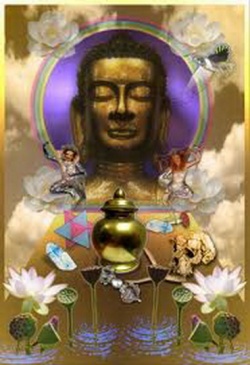Three doors
Jump to navigation
Jump to search
A person's three doors (Skt. tridvāra; Tib. go sum; Wyl. sgo gsum) are his or her:
- body (Skt. kāya; Tib. lü; Wyl. lus),
- speech (Skt. vāk; Tib. ngak; Wyl. ngag), and
- mind (Skt. citta; Tib. yi; Wyl. yid).
The Buddha used the term "door" for body, speech and mind as they are the only three means that sentient beings like us have to function and interact with the world. Through these three doors, we accumulate either positive or negative karma. Of the three, the mind is the ‘boss’, and the body and speech are subservient.
Through these three doors, we accumulate either positive or negative karma. Of the three, the mind is the ‘boss’, and the body and speech are subservient.
In Vajrayana, the three doors are considered to be, in essence, the three secrets or three vajras.
Alternative Translations
- Three avenues of being
- Three gates
